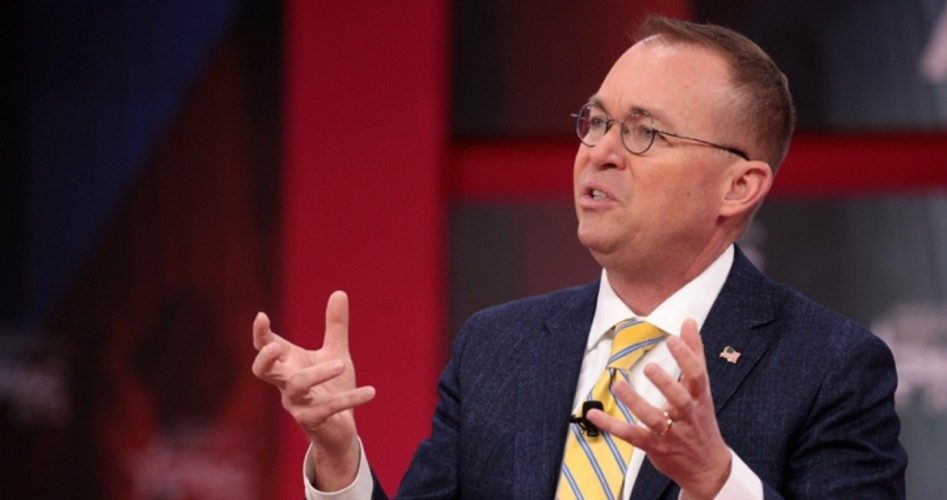
Over the years, constitutionalist conservatives have spent much time worrying about this or that aide to a president, concerned that the aide is influencing the president to take a less-conservative course of action. There is little doubt that President Donald Trump was influenced by aides, for example, to bomb Syrian targets, and otherwise interfere in that country’s civil war.
With the selection of former Representative Mick Mulvaney (R-S.C.; shown) as “acting” chief of staff for President Trump, however, there may be someone close to the president who can steer him to take a more conservative and constitutional course, in both domestic and in foreign policy.
Before Trump named Mulvaney to replace outgoing General John Kelly late last week, Mulvaney had been already serving in the Trump administration as director of the Office of Management and Budget (OMB).
One piece of evidence that Mulvaney is a good choice is the hostile reaction he provoked when Trump picked him to lead up OMB. Leftist Salon, for example, criticized Mulvaney’s selection to head up OMB, noting that he had been a strong critic of the Federal Reserve System. So did the leftist Mother Jones. MSNBC and the New York Times also weighed in, denouncing the pick.
Another piece of evidence that Mulvaney can be expected to offer advice more in line with the Constitution than most aides have given presidents in recent decades — Democrat or Republican — is Mulvaney’s 83 percent score on the “Freedom Index,” published by The New American. Mulvaney earned his high score by casting several votes considered consistent with the U.S. Constitution.
During his last year in Congress, Mulvaney continued his well-earned reputation as a budget hawk by voting no to “continuing appropriations.” Continuing appropriations is a way for Congress to simply kick the can down the road and never come to grips with cutting federal spending.
Mulvaney’s other votes established him as more than just a “fiscal” conservative, as important as that is. He opposed warrantless surveillance by U.S. intelligence agencies; opposed green energy mandates for the military; voted to end funding for implementation of the 2001 Authorization for Use of Military Force (AUMF), which originally was supposed to be limited to the war in Afghanistan but has been abused to authorize presidential war-making anywhere, anytime, and for any reason in the Middle East over the last nearly 18 years; voted against foreign aid to Pakistan and against aid to Jihadists in the Syrian civil war; voted to authorize the Speaker to file a friend-of-the-court brief that President Barack Obama had acted in a manner not consistent with his duties, when he issued an executive order to defer deportation of certain illegal immigrants; and voted to repeal significant portions of ObamaCare.
That was just in 2016, his last year in Congress. In 2015, Mulvaney voted to allow states to opt out of Common Core, without any direct — or indirect — penalties from the federal government. He also voted against Trade Promotion Authority (TPA). TPA is when Congress delegates its constitutional authority over trade to the president, by authorizing him to negotiate trade agreements and leaving Congress only the power to vote the agreement up or down.
On occasion, Mulvaney has made a bad vote. One example of that was when he voted to repeal Country of Origin Labeling (COOL). This was a reaction to the World Trade Organization (WTO) ruling that the United States had to repeal its law (COOL) which required labeling for the country of origin for imported beef, chicken, and pork. As Rep. Thomas Massie (R-Ky.) said, explaining his own no vote to repeal of COOL, “What is the World Trade Organization, and who are they to tell Congress what laws we have to pass?”
Mulvaney has a long record of conservative votes and actions, dating back to his tenure in the South Carolina Legislature. Before that, he graduated from Georgetown, where he majored in international economics, commerce, and finance. He then graduated from the law school at the University of North Carolina. After that, he practiced law and operated a regional restaurant chain.
Once in Congress, Mulvaney aligned himself with the Tea Party, and was a founding member of the Freedom Caucus, and has consistently opposed gun control legislation and ObamaCare. In 2015, Mulvaney voted no to a compromise to avert a government shutdown, because the appropriations bill included funding for Planned Parenthood. He said, “This is not about women’s health. It’s about trafficking in pieces of dead children.”
Finally, another piece of evidence that Mulvaney is much more conservative than most aides of Trump, or any other president, Democrat or Republican, is that in September 2015, he endorsed Kentucky Senator Rand Paul in the Republican race for president. Paul has the highest score of any sitting senator on the Freedom Index.
While Mulvaney’s appointment is as “acting” chief of staff, an unnamed senior administration official told White House reporters, “There’s no time limit. He’s the acting chief of staff, which means he’s the chief of staff. He got picked because the president liked him [and] they get along.”
One recent criticism from the Right on Trump’s presidency came from Tucker Carlson, who has been generally supportive of the president. Carlson argued on his Fox News show recently that Trump has failed to deliver on some campaign promises because he does not understand how to get things through Congress. In this regard, Mulvaney is a former congressman, and the unnamed senior official said of Mulvaney: “He knows Congress. He knows Capitol Hill.”
Constitutionalist conservatives have reason to be cautiously optimistic about the Mulvaney pick.
Photo of Mick Mulvaney: Gage Skidmore

